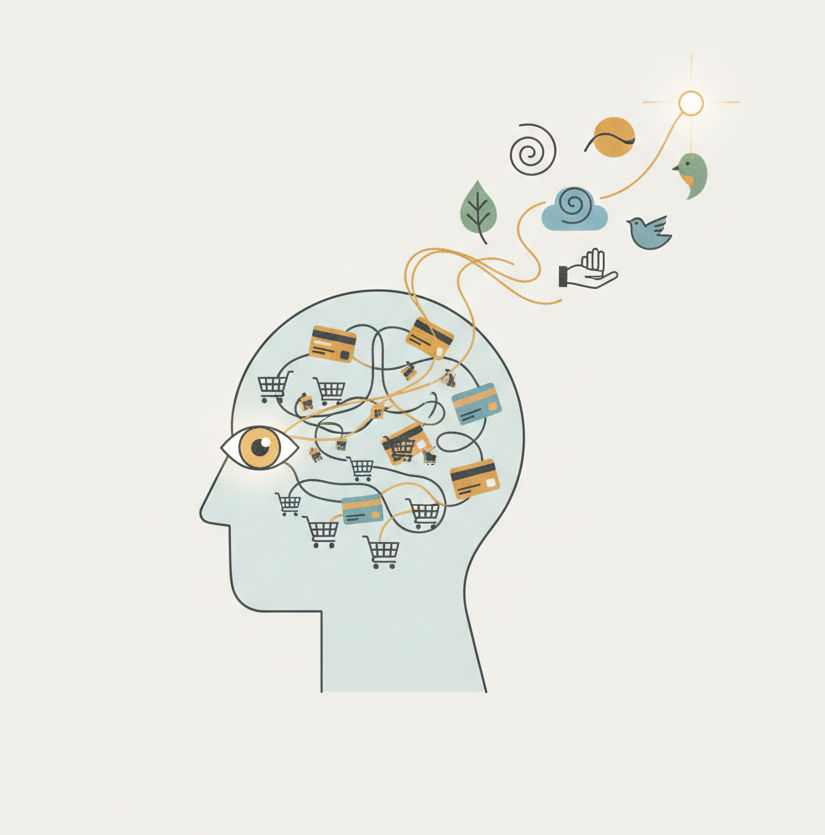Everything, Everywhere, Now: The Choice of Action
- Edria Davine
- Oct 5, 2025
- 4 min read
When I looked at the ceiling, I realized that in a rectangular room, the light dims somewhere but shines everywhere else. Physics might have a technical explanation for this, but I like to believe that human beings are just like that light. In a world full of “unending” choices, you feel like you’re on top of the ceiling—feeling able to do anything with a wide variety of everything. To you, the whole world seems to light up instantly.
But the light has to dim somewhere. In Everything Everywhere All at Once (2022), the main protagonist Evelyn, often wonders about how life would have been if she had chosen another career path. Would she have been happier, or would she have preferred managing her laundromat and tax problems, along with family issues? The decisions she had made in the past resulted in her becoming “nothing,” and she accepted that. Eventually she used the laundromat’s financial issues to keep her busy from her family. She dived into a multiverse of possibility where her life made much more sense.
“I saw my life without you. It was beautiful,” she said to her husband.
Human brains are always searching for ways to better themselves, and the more they dive into this, the more they feel like the universe has more control over them than they do—and this character has done it for us. Verse-jumping to those dream lives never gave her more freedom. It just gave her another reason to believe that if the possibilities are that infinite, we humans don’t matter. Here, her light was shining everywhere; but it was too bright for her to stand in it.
Psychologists Sheena Iyengar and Mark Lepper’s Jam Study (2000) demonstrated a similar paradox of choice where they quadrupled the option of 6 jams to 24. 24 jams attracted 60% of shoppers, but only 3% bought them; while 6 jams attracted fewer shoppers but 30% of them were bought.
Just as the buyers froze in choosing the 24 jams, Evelyn froze before the “better and more beautiful” lives she could have lived. She dimmed her own light by staying inside the regret of her past. Sometimes the more the light shines, the more we end up in paralysis and just…
freeze.
In this paralysis, how are we any different from a rock? The movie reminds us in the “rock universe” that every scientific discovery in the universe only makes us feel smaller and smaller. Yet, we are still burdened with the weight of past, present, and future decisions and boulders. By becoming rocks, we can desist from the weight of decisions and noise—but as humans, we are condemned to carry the weight of responsibility. One thing we forget is that it is human to regret, fail, and fear. It’s the curse that gives us meaning.
Notice how humans mistake boundaries for cages. Humans do not simply cease to exist. Boundaries for existence are simply conditions to be able to feel true freedom. The universe never guarantees anything with the choices we make. Which is why Albert Camus, who wrote The Myth of Sisyphus, calls humans’ overwhelming freedom of choice in search for meaning “absurd.” Camus had never ensured happiness in the choices we make; he promised rebellion against the absurdity of living despite its lack of meaning. Although it is up to the individual to call him/herself a nihilist, each individual existence is still viewed as particular and unique. Existence forces us to decide and forces us to deal with whatever consequence we get. Unlike rocks, shaped by natural processes, humans are shaped by nature,nurture, and most importantly—themselves.
Now let’s say that I actually turn into a rock. Doesn’t the light dim for me? My “options” would only be controlled by external forces. Life would be easier and emptier. This is when I feel that meaning in anything around us is absurd. Just like what Camus said, the therapist in Struggling with Meaninglessness (Vanhooren, 2019) tells his patient to directly confront absurdity. Instead of trying to solve his patient’s nihilistic crisis, he tells him to face it. Session after session, the patient concluded:
T7: And that’s my purpose in life?
C7: The only … [silence]. Thinking about religion; whether I die as a religious person or as an atheist …that doesn’t matter …That doesn’t matter! But being a father, being a husband, being a friend, …
T8: Being yourself …
C8: Being yourself …emerges by being with the other …That’s the only thing that matters.
So, as a simple rock in the universe with no plan and no rules inside me, I realize that there are literally no rules at all. The dimming of light never automatically means failure. Recognizing brightness is to recognize the shadow. Therefore, the next time the choices feel heavy and scary, I’d just picture myself as the rock. The only way life matters to me is if I matter. So, as a rock, I choose to roll. I choose to roll first, wherever I want to, because I can—before the universe gives me a reason to. I don’t blame the nature that shaped me into an igneous or metamorphic rock; the point is that I roll now—and that is enough for me to call it living.




Comments